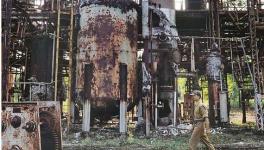Learning from Bhopal
The Bhopal verdict has exposed the soft ugly underbelly of the entire Indian judicial, regulatory, administrative and corporate governance systems, not to mention the scandalous behaviour of the US government and US-based MNCs. The judgment is only one piece in a sordid saga going back 26 years, one which will continue to unfold, not just in this case but in other spheres too.
Bhopal happened because all norms and rules were flouted in the full knowledge that the system would keep violations from the public gaze and protect the perpetrators if anything went wrong. The Carbide factory handled highly hazardous chemicals, yet dense residential areas were allowed to come up around it, there were no warning systems, no emergency plans. The parent Union Carbide Corporation (UCC) in the USA knowingly transferred technology with absent or under-designed safety systems to its Indian subsidiary UCIL and just watched as the latter cut corners on safety procedures. Tons of evidence showing criminal culpability are available, including smoking guns like UCC safety audit memos and the official Varadarajan Committee report. But prosecuting agencies would not push its case, a capricious judge simply ruled out culpable homicide, a state government brazenly escorted an arrested accused out of Bhopal, and successive central governments fudged and fumbled. And India still bends its own laws and bends over backwards to please US investors and send the “proper message”.
Has Indian governance learnt anything? After Bhopal, a host of new laws and regulations were passed, but monitoring and implementation totally ignored. Rules without enforcement and consequences for violation might as well not be there.
Today, import of hazardous materials into India is rampant, unregulated and encouraged. Even lax control has been rendered unnecessary by redefining hazardous substances as raw materials for recycling. Environmental appraisals are a mockery through the clever route of “in principle” approvals pending formal clearance during which time projects are so far advanced that courts rule against stopping them. Mercury thermometers in Kodaikanal, hazards-laden ships in Alang, e-wastes and discarded lead-acid batteries, the nightmare continues. And regularization charges can always be levied post-facto which only legitimizes violations. No wonder unexploded ordnance from Iraq blows up in Ghaziabad furnaces, oil storage tanks burn in Jaipur while the National Disaster Management Agency only watches it burn out, radioactive cobalt is casually sold as scrap and the all-seeing Atomic Energy Regulatory Board knows nothing about it. Everything is de facto, and de jure can be adjusted to conform.
The government now wants to exempt US nuclear power suppliers from liability even for defective equipment, agreeing with the US that the tortuous Bhopal process be avoided. On the other hand, our Law Minister thinks there should be a new tougher law for special-case disasters like Bhopal. Really? India needs to see that the laws it already has are actually enforced, and that those who flout them are prosecuted and punished. India needs effective and independent institutions that work without fear or favour. India needs a system that cares for all its citizens, not just the rich and well-connected. India needs to redeem its self-respect, not cringe before the West especially the US. But in an India dominated by those who benefit most from the present anything-goes system, who think progress is becoming like the West but don’t realize that those countries are highly regulated and law-enforcing, is anyone listening?
Get the latest reports & analysis with people's perspective on Protests, movements & deep analytical videos, discussions of the current affairs in your Telegram app. Subscribe to NewsClick's Telegram channel & get Real-Time updates on stories, as they get published on our website.























